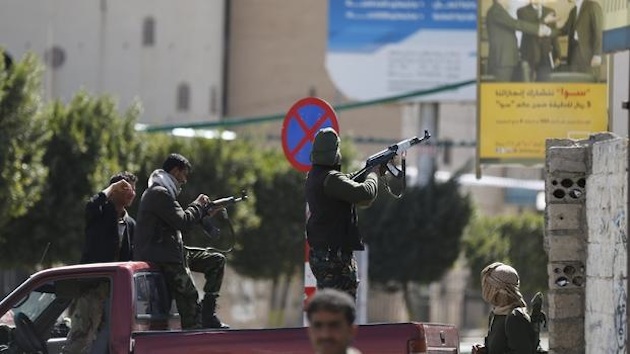

A Houthi fighter fires at forces guarding the Presidential Palace during clashes in Sanaa January 19, 2015. (REUTERS/KHALED ABDULLAH)
Yemen President Abed Rabbo Mansour Hadi has resigned amid pressure from Shiite rebels confined the former leader to his home for the past two days. The development comes less than a year after President Obama cited the country as a model for how his administration plans “to degrade and ultimately” the Islamic State (ISIS).
The Iran-backed Houthi rebels seized the capital in September in an effort to push out the Western-backed government, despite what the president called good faith negotiations to halt Iran’s nuclear program.
Yemeni officials said Hadi resigned because he was being pressured to make concessions to the rebels, and to give a televised speech to calm the people in the streets. Prior, Hadi pledged political concessions in return for the rebels withdrawing from his house, which they have been shelling for at least two days, and the nearby presidential palace. However, sensing the government on the ropes, the rebels refused to take the deal.
Twenty-four hours after signing the deal, heavily armed Shiite rebels remained stationed outside Hadi’s house and the presidential palace.
Meanwhile, State Department spokeswoman Jen Psaki said Thursday that the U.S. is still “assessing the situation and working to confirm” the developments.
“We are seeking a peaceful transition,” Psaki said.
It was unclear what information the administration was still seeking, as the Yemeni government also confirmed it had submitted its resignation Thursday.
Prime Minister Khaled Bahah’s resignation came as the U.N. envoy to the Arab world’s poorest country met with representatives from the Houthis and other factions to try to implement a prior deal allegedly reached Wednesday. Yet, that deal failed to end the crisis and violence.
Under the agreement, the group’s militias were to withdraw from the presidential palace and key areas of the capital they have overrun in recent days in return for political concessions.
At this point, it also remains unclear what faction or how many currently control the country or specific territories. The wildcard remains al Qaeda in Yemen, or al Qaeda in the Arabian Peninsula (AQAP), whose leader last week claimed responsibility for the attack on French satirical newspaper Charlie Hebdo in Paris. While the Shiite rebels, whose official slogan is “Death to Israel. Death to America,” have pledged to dismantle the terror network, they are obviously strongly anti-West and anti-Israel.
Bahah, a political independent, saw his technocratic government established as a result of a November United Nations-brokered peace deal implemented after the Houthis overran the capital in September. Posting to his official Facebook page, he said his tenure in office began during “very complicated circumstances,” and that he resigned in order to “avoid being dragged into an abyss of unconstructive policies based on no law.”
“We don’t want to be a party to what is happening or will happen,” he added.
Judging by the response from Psaki, neither does the Obama administration.







